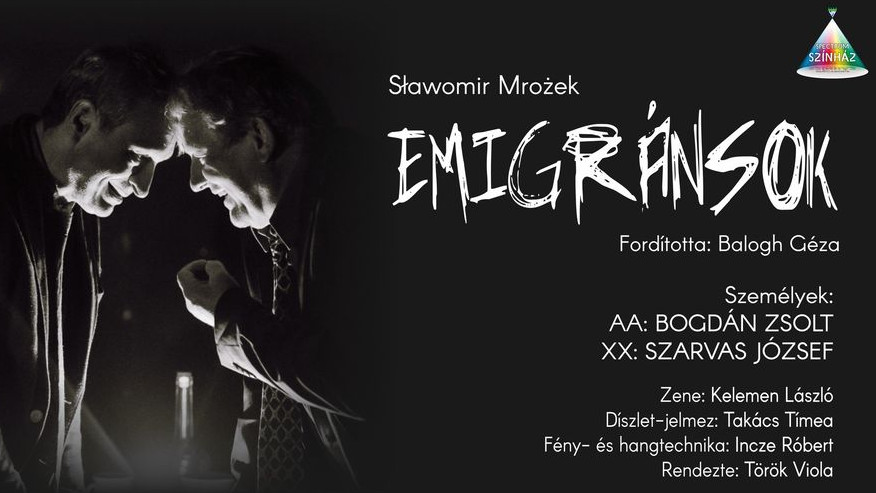Immigrants (HU)

Feb-12
Motto: "We cannot be sure that we are, nor that we are not."
This quote is the end of one of Mrozek's original lines of thought, based on the idea that we neither remember our birth nor will we remember our death. Therefore the question of existence itself becomes absurd. This, on further reflection, calls into question the meaning and purpose of life and the endless efforts and sacrifices for dreams. Yet it seems that Madách's exhortation "Man, strive and trust" prevails even when the struggle for a better life seems utterly hopeless.
From the very first minute, "The Emigrants" suggests a familiar feeling of life, the positive power of self-realisation "for no other reason", which helps us to remain in the world around us as individuals with our own thoughts and feelings, as free little people with their own opinions. But it hurts me when the other me cruelly exposes self-realisation by questioning my real existence.
The two anonymous extremes-men AA and XX-help and criticize each other in such a way that we gradually realize that they need to live in a basement apartment somewhere in the world far from home because only in this way can they mirror each other, find themselves and endure a hopeless future that may only bring more knowledge and wisdom.
The two characters, light years apart, represent the social extremes: the worker and the intellectual who scorns and criticises him. This only seems clear at the beginning of the play, but it gradually becomes clear that they need each other to understand and endure the big issues of life.
Is a common lock really necessary to understand each other, making indifference and mutual helplessness impossible? Is this also only possible in a kind of emigration?
Of course, real emigration is more relevant than ever, even if in a different historical context than at the time the play was written. While XX has a wife and two children, for whom he would like to build a big house and an even bigger one, even if his health is failing him, AA would like to write his thoughts and life's work, as a kind of world-changing philosopher who has discovered the meaning or meaninglessness of life.
The forced couple living in a dilapidated basement apartment at a pittance of a price is reminiscent of the "temporary" roommates who have moved from the village to the city (XX) or to an unknown city (AA), who will never leave this unworthy place where they have exiled themselves in the hope of realising their unattainable dreams.
Cast:
AA: Zsolt Bogdán
XX: József Szarvas
Music: László Kelemen
Set, costumes: Tímea Takács
Music and lighting by Róbert Incze
Directed by Viola Török
Tickets can be purchased at the Spectrum Theatre box office (open on weekdays between 9 a.m. and 1 p.m.) or before the performance.
For advance reservations, please call 0744-301.875.
This quote is the end of one of Mrozek's original lines of thought, based on the idea that we neither remember our birth nor will we remember our death. Therefore the question of existence itself becomes absurd. This, on further reflection, calls into question the meaning and purpose of life and the endless efforts and sacrifices for dreams. Yet it seems that Madách's exhortation "Man, strive and trust" prevails even when the struggle for a better life seems utterly hopeless.
From the very first minute, "The Emigrants" suggests a familiar feeling of life, the positive power of self-realisation "for no other reason", which helps us to remain in the world around us as individuals with our own thoughts and feelings, as free little people with their own opinions. But it hurts me when the other me cruelly exposes self-realisation by questioning my real existence.
The two anonymous extremes-men AA and XX-help and criticize each other in such a way that we gradually realize that they need to live in a basement apartment somewhere in the world far from home because only in this way can they mirror each other, find themselves and endure a hopeless future that may only bring more knowledge and wisdom.
The two characters, light years apart, represent the social extremes: the worker and the intellectual who scorns and criticises him. This only seems clear at the beginning of the play, but it gradually becomes clear that they need each other to understand and endure the big issues of life.
Is a common lock really necessary to understand each other, making indifference and mutual helplessness impossible? Is this also only possible in a kind of emigration?
Of course, real emigration is more relevant than ever, even if in a different historical context than at the time the play was written. While XX has a wife and two children, for whom he would like to build a big house and an even bigger one, even if his health is failing him, AA would like to write his thoughts and life's work, as a kind of world-changing philosopher who has discovered the meaning or meaninglessness of life.
The forced couple living in a dilapidated basement apartment at a pittance of a price is reminiscent of the "temporary" roommates who have moved from the village to the city (XX) or to an unknown city (AA), who will never leave this unworthy place where they have exiled themselves in the hope of realising their unattainable dreams.
Cast:
AA: Zsolt Bogdán
XX: József Szarvas
Music: László Kelemen
Set, costumes: Tímea Takács
Music and lighting by Róbert Incze
Directed by Viola Török
Tickets can be purchased at the Spectrum Theatre box office (open on weekdays between 9 a.m. and 1 p.m.) or before the performance.
For advance reservations, please call 0744-301.875.
